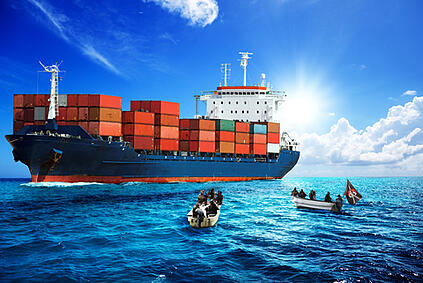What pops into your head at the word “pirate”? For many, it’s Johnny Depp and Disney’s Pirates of the Caribbean movies. Usually, our pirate imagery goes back to the scalawags of centuries gone by, attacking ships with swords, cannonballs, and the occasional peg leg.
Most think of piracy as a serious problem that was on the seas in the 1600’s, 1700’s, or 1800’s. What many of us don’t realize is that piracy is an increasing problem on the seas of today’s world.
Today’s pirates are more than just another reason to get marine insurance on your cargo shipments.
 “As long as there have been ships, there has been piracy,” said medieval historian, Melissa Vineyard. Today is no different. Of course, the look of piracy has changed. Automatic weapons replace swords. Rocket propelled grenades (RPGs) replace cannonballs. Prosthetics would replace peg legs, but I can’t say I’ve heard stories of pirates running around on prosthetic legs. What I have heard are some stats on piracy in today’s world.
“As long as there have been ships, there has been piracy,” said medieval historian, Melissa Vineyard. Today is no different. Of course, the look of piracy has changed. Automatic weapons replace swords. Rocket propelled grenades (RPGs) replace cannonballs. Prosthetics would replace peg legs, but I can’t say I’ve heard stories of pirates running around on prosthetic legs. What I have heard are some stats on piracy in today’s world.
Here are some figures on piracy acts reported to and published by the International Maritime Bureau (IMB) for the first six months of 2011:
266 pirate attacks on the world’s seas. Nearly a 75% increase from same period of previous year.
29 vessels hijacked.
495 crew members taken hostage.
13 kidnapped.
7 killed.
99 vessels boarded.
76 vessels fired upon.
Somalia has become the epicenter for pirate activity in today’s world. Certainly Somalia is not the only place pirates come from nor are the waters around Somalia the only ones in which ships are at risk of being victimized by piracy; however, over 60% of the attacks during the first six months of 2011 were committed by Somali pirates.
There is actually a vast area where Somali pirate attacks are happening. This area includes the Gulf of Aden, the southern Red Sea, off Yemen and Oman, the Arabian Sea, off Kenya and Tanzainia, off Seychelles and Madagascar, off Mozambique, in the Indian Ocean, and off the Indian west coast and Maldives west coast.
Somali pirates are not only stealing goods from ships, but taking crews for ransom.
According to the 2011 Q2 IMB Piracy Report, “As of 30 June 2011, the Somali pirates held 20 vessels for ransom with 398 crew members of different nationalities as hostages. In addition, these pirates are also holding 22 kidnapped crew members hostage.”
Piracy has a serious impact on the world of ocean freight international shipping. Pirates have been attacking all sorts of vessels, including general cargo, bulk carrier, RORO, and container ships.
The typical way pirates are attacking is by approaching a large ship in small motor or speedboats and firing upon or attempting to board the ship.
There is some good news. Even though the number of pirate attacks has been increasing, the proportion of successful attacks has decreased since last year. IMB’s report says this is due to “increased vessel hardening and effective naval intervention and disruption of Pirate Action Groups (PAGs).”
IMB goes on to say, “It is vital that this naval presence be sustained or increased.”
There is also a movement for ship owners and shipping lines to defend themselves. An article from Supply Chain Brain describes a “shift in the world’s attitude toward maritime piracy in recent months.”
Shipping lines and owners are turning to armed guards and bullet proof vests to protect their ships, crew, and cargo. While hiring specially trained men for protecting ships against pirates could save lives and millions of dollars in cargo loss and ransom payments, many countries won’t allow commercial ships to enter their water territories with men armed with automatic weapons onboard, even if they’re strictly for defensive purposes.
For years, ships have been encouraged not to fight back against piracy, but to attempt to outrun and outmaneuver pirates while calling in the authorities to come in and handle the pirates.
Do you think this is fair to ask of those in the dangerous world of international sea shipping? Lives and livelihoods are at stake.
But is fighting fire with fire better?
The video below that’s been floating around the web for about a year presumably shows Russian commandos handcuffing Somali pirates to their vessel and blowing it up. Be advised, the video contains graphic material.
Comment below on whether you think ships should be allowed to hire armed guards to protect their crew and cargo.

Of course as we have Interpol, we need to protect our Oceanic burglary and Ocean assests through an international body.